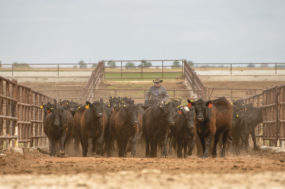For a farm family, your neighbors are for life – or at least until they get to a certain age and then move to town. Even then, oftentimes the farming child moves back onto the homestead. Around my family farm, the last names are the same, even though the faces have become younger.
Consistent neighbors create a sense of familiarity, safety and a broader sense of family, but there is also a sad side. Every time I go home to visit my dad at the farm, memories come flooding back of the neighbors, merely within a 3-mile radius, that have died in farming accidents.
I remember my neighbor Curt, a senior in high school, who was killed when his tractor rolled over. Then there was Mark, my first crush, who was killed in a skid loader accident when he was a young father.
I also frequently think of Wally, my dad’s best friend and the man who encouraged my interest in horses, who got caught between a mean bull and a fence. In every case, the neighbors came together in shock to mourn and then again to help the family with the farming.
A dangerous business
According to the National Safety Council (NSC), the agricultural industry is considered the “most dangerous industry.” In fact, the NSC has stated, “In terms of death rates by industry, the agriculture, forestry, fishing and hunting sector topped the death rates chart in 2014 with 24.7 fatalities per 100,000 workers, higher than mining (14.1), transportation and warehousing (12.3), and construction (9.2).”
In 2013, 459 agricultural workers died from work-related injuries. The fatality rate for agricultural workers was 7.75 times higher than the fatality rate for all workers in private industry; agricultural workers had a fatality rate of 21.7 deaths per 100,000, while the fatality rate for all workers was 2.8.
Fortunately, most accidents do not result in death; each day about 150 agricultural workers suffer a serious lost-work-time injury. Fifty-nine percent of these injuries result in days away from work, job transfer or restrictions.
In 2013, the injury rate for agricultural workers was greater than 62 percent higher than the rate for all workers. Crop production agricultural workers’ injury rates were 5.5 per 100 workers. Animal production agricultural workers’ injury rates were 6.2 per 100 workers. (The rate for all private workers was 3.3.)
Take action
Invariably, each year the extension service and other ag agencies provide a number of training programs aimed at mitigating agricultural hazards. But given that accidents do and will continue to happen, more farm owners, farm families and workers should also be aware of the actions they should take to protect their families and their businesses in the event of a death or injury.
Each farmer should ask him or herself, “If something happened to me, such as a premature death, would my family have sufficient income sources to maintain their standard of living?”
Considerations are: If the spouse would work, the impact of the cost of children’s education, the impact of inflation, what assets could be sold and how much would be available from retirement accounts and other investments.
The answers to the above questions and knowledge of reoccurring family expenses are needed to determine whether or not there is an income-source shortfall.
Life insurance, typically, provides the best solution to cover any shortfall. Term insurance, which may last any number of years up to a maximum of 30, is often used to cover short-term defined needs – such as the lost income from the primary bread-winner and college expenses.
Permanent insurance, which may be some form of universal life insurance or whole-life insurance, may be used to help cover lifetime expenses. An insurance agent can propose options that should help meet your various needs.
However, life insurance doesn’t help you if you’ve become disabled either temporarily or permanently. Essentially, a disability could result in your “economic death” – meaning the end of your ability to earn income.
Your earning ability is probably your largest single asset, and its loss will have a devastating impact on you, your family and your farm. It is more likely to occur than the loss of your car or house, things you’ve probably already planned for.
Most of the questions that were asked in the event of your premature death should be asked, as well, in the event of a disability. Although agriculture is a highly dangerous industry, fortunately there are a few companies that provide disability insurance for farm owners.
There are two types of disability insurance that should be considered:
-
Long-term disability income insurance provides you with comprehensive, long-term benefits that would cover disability from an accident or sickness up to age 67.
This policy will pay you a monthly benefit if you are unable to work due to a disabling accident or sickness. You can tailor this policy by selecting the elimination period, benefit period and optional riders that would best meet your needs.
-
Business overhead expense insurance helps business owners maintain their business in the event they become disabled due to a sickness or injury. If you own a business, no matter how comprehensive your medical coverage may be or how much individual disability income insurance you may have, it’s important to have money available to help cover monthly expenses for your business if you become disabled.
Expenses such as employee salaries, rent, utilities, maintenance, taxes, interest on business loans and so on. Coverage is flexible and can be tailored to your business needs and budget. And premiums may be tax-deductible.
I’m sure you know of similar farm accidents, like those I mentioned at the beginning of this article. Like me, I’m sure you’ve wondered if the families left behind were financially OK.
You owe it to your family and your business to review your personal situation and do the right thing to make sure your dependants will be OK in the event you too become a victim.
Yes, you can count on your lifetime neighbors to help and support your family the first few weeks after a tragic event. But afterward, it is the actions you take and the plans you implement today that will provide for them over the long run.








